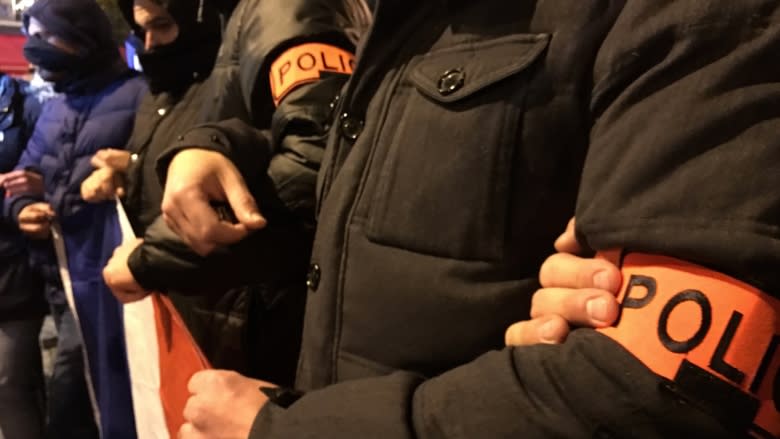'We've been worn down': French police fed up with state-of-emergency working conditions
Last night, for the fourth night in a row, French police broke their own rules.
In cities across the country including Bordeaux, Toulouse, and Lyon — where their numbers swelled to over 800 — officers gathered in the streets to protest.
In Paris, close to 500 marched from monument to monument, declaring their anger, decrying their working conditions and demanding the police chief step down.
The protests are unauthorized, unsanctioned, but they don't care. They're fed up and insist they be heard.
"Our working conditions have deteriorated so much, we're exhausted. Over the past year, since the Charlie Hebdo attacks actually, we've been worn down. There just aren't enough of us," says an 11-year veteran with the National Police.
He, like most of those protesting, prefers to remain anonymous for fear of reprisals from upper echelons. Scarves are pulled over their noses, hoods over their heads, some are even entirely masked with balaclavas.
As a pack, they bear a striking resemblance to the protesters they usually confront and disperse, often with tear gas and water cannons. Distinguishing orange armbands that say "police" aren't enough to dispel the irony, but their cause is, so far, mostly popular.
Frustration about fatigue
As they walk from the Champ de Mars to the Champs Elysée, blocking roads and upsetting traffic along the way, their call for public sympathy is heard. Patrons at the Peninsula hotel rise up and join the police in singing La Marseillaise.
Frustration about fatigue has been festering for months. Police officers say they're understaffed and overstretched by the almost year-old state of emergency.
"We're asked to do things that have nothing to do with police work, like guarding theatres and synagogues and churches. It's becoming unbearable, we can't do it all," says Nathalie, a member of the forces for 12 years. She was the only person who gave her name, but still inched her scarf over her nose before being photographed.
A less-seasoned policeman, a 23-year-old with two years' service, believes the cost of the security measures is public safety itself.
"If somebody dials 17 [France's 911], there aren't any cars around to respond. Misdemeanours, felonies ... we don't have time for that anymore," he says.
A case in point, and the one identified as the last straw by the cops, occurred on Oct. 8 in Viry-Chatillon, in a dodgy part of the southern Paris suburb.
The numbers are inexact, but 10 to 20 people attacked two surveillance cars with rocks, metal bars and Molotov cocktails. Of the four officers assaulted, two were severely burned and one remains in hospital.
"We're fed up with being targeted. And it's become quite clear that we don't have the support of our bosses. A burnt cop doesn't matter," Nathalie says.
"We're human too. We have families too. We have to show that we're not going to take it anymore."
The Viry-Châtillon attack may have been the catalyst for the first protest, but it was remarks the next day by the head of the national police force that fuelled the movement.
Director Jean-Marc Falcone characterized the protest as "unacceptable" and called for an internal investigation. He's since backtracked, but the damage was done.
More protests planned
As the march proceeds down the Champs Elysée, an outraged bystander shouts out, "Is this what I pay taxes for?" One of the protesters shoves him with his shoulder, arguably by accident but obviously with intent.
"There's no investigation without sanctions," says one of the more zealous leaders of the pack. He too refuses to give his name, but his face is uncovered and he's willing to go on camera.
Once again, the procession stops long enough to let him speak. He's immediately swallowed up in a media scrum.
"I'm ready to sacrifice myself. I don't care," he explains why he's willing to identified.
"I want things to change. Nothing's happening, no one is listening. So we're going to make the decisions now, control our own future. We want to meet with [Minister of the Interior Bernard] Cazeneuve, but without the unions. They're liars, they're politicians. The bosses have no idea what it's like to get attacked with stones or Molotov cocktails."
Overnight, President François Hollande announced that he'd meet with police unions early next week.
Then, late the next day, it turned out that man who was "willing to sacrifice himself" hasn't been with the police since 2014. Rather, he's a well-known agitator with ties to the National Front.
- ANALYSIS| Hollande takes heat for anti-terror strategy after Nice attack
- ANALYSIS| Paris attacks confirm France's worst fears
The police may eventually get what they want, but they may serve Hollande's adversaries well, too.
And meanwhile, the image of France's security forces demonstrating against the state continues to speak of the effects of terrorism and the instability it aims to create.





